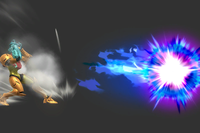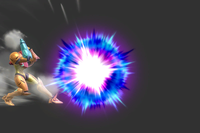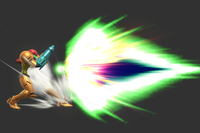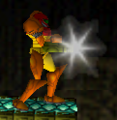Charge Shot: Difference between revisions
m (→Trivia) |
|||
| Line 126: | Line 126: | ||
==Trivia== | ==Trivia== | ||
*When [[Kirby]] uses this move, he uses his hands to charge and fire the shot. | *When [[Kirby]] uses this move, he uses his hands to charge and fire the shot. He will use two hands with Samus' copy ability, and only one with Dark Samus'. | ||
*The charging sound for the Melee Charge Shot is shared with the [[Mii Gunner]]'s [[Charge Blast]]. | *The charging sound for the Melee Charge Shot is shared with the [[Mii Gunner]]'s [[Charge Blast]]. | ||
*This move shares its name with [[Mega Man]]'s [[forward smash]]. | *This move shares its name with [[Mega Man]]'s [[forward smash]]. | ||
Revision as of 18:25, May 16, 2020
| Charge Shot | |
|---|---|
{{{content1}}}
{{{content2}}} Charging and firing the attack in Ultimate. | |
| Users | Samus Dark Samus |
| Universe | Metroid |
| Article on Metroid Wiki | Charge Beam |
Charge Shot (チャージショット, Charge Shot) is Samus and Dark Samus's neutral special move.
Overview
Pressing the special move button will cause Samus to start auto-charging energy in her arm cannon, which can be fired by pressing the button again. When the attack has reached maximum strength, Samus will stop charging and resume her neutral standing position, but her arm cannon will start to flash. Pressing the special move button in this state will let her fire the fully charged shot. While charging, the player can press the grab or shield button or the control stick left or right to cancel the charge and/or dodge or roll, and pressing the special move button again will resume her charge. This is called charge-canceling. If Samus is hit while she's charging, she will drop all the stored charge.
When used in the air in all games except for Ultimate, Samus will instantly fire, whether the beam was previously charged or not; thus, the move cannot be charged in the air. A fully charged shot does 25% damage. The attack inflicts great knockback at higher damage percentages and is a good projectile for edgeguarding. A fully charged shot can also break a Smash Ball in one hit (although the charging time must be taken into account if planning this).
In Super Smash Bros. Melee, Samus's down throw can be used to immobilize an opponent just long enough to allow a quickly-fired Charge Shot to connect with the opponent. This down throw + Charge Shot combo is highly effective against almost every character. Young Link is a notable exception, due to his high rebound height after being thrown down.
In all regional versions of Melee, Samus will lose her charge if she is hit out of her Screw Attack.
In Super Smash Bros. 4, a Miiverse post first claimed it had "drastically improved" speed and power. Indeed, the attack as a whole has been improved considerably, with a slightly faster charging time, quicker startup, and significantly improved knockback that can KO at 115% from the middle of Final Destination. With these buffs, this makes Charge Shot one of Samus's standard finishing options.
In Super Smash Bros. Ultimate, Samus can now charge her shots in midair. This can be cancelled by jumping or air dodging. Additionally, Dark Samus, being an Echo Fighter of Samus, retains this move; compared to Samus, Dark Samus's version is fired at a slightly lower elevation, allowing her to hit grounded targets that Samus cannot.
Stages
Charge Shot has eight different stages of damage and knockback that is determined by the charge of the attack; there are seven stages of charging and the eighth stage is when the Charge Shot is fully charged. Unlike certain other charge attacks such as Giant Punch, the damage and knockback do not decrease when used in the air, and the last stage of charging is strictly weaker than the fully-charged stage, as expected.
| Stage | Damage | Percent that can KO in Brawl |
|---|---|---|
| Stage 1 | 3% | Cannot KO |
| Stage 2 | 5% | 802% |
| Stage 3 | 8% | 486% |
| Stage 4 | 11% | 348% |
| Stage 5 | 14% | 254% |
| Stage 6 | 18% | 176% |
| Stage 7 | 21% | 137% |
| Stage 8 | 25% | 124% |
Charge cancel
In all games so far, Samus is capable of interrupting the charge of the attack by pressing the shield button. Since it is possible to go directly into a jump while shielding, charge canceling can be used to bluff an opponent by allowing them to come close to the player while they're charging, only to find themselves attacked by an aerial. Because the shield button is held down to cancel the shot, many players that are just learning the basics of this technique will perform an aerial Grapple Beam afterwards, since they do not let go of the shield button quickly enough. However, with precise timing, it becomes possible to perform any action that an airborne Samus would normally be able to do.
Instructional quotes
| Hold | ||
| Charge with the B Button and press again to fire. Press the Z Button to stop charging and resume later with the B Button. | ||
| Charge energy, and fire a shot with | ||
| Charges up a projectile while on the ground or in midair. Can keep the charge after dodging or shielding. | ||
| Charges up a projectile while on the ground or in midair. Can keep the charge after dodging or shielding. |
Customization
Special Move customization was added in Super Smash Bros. 4. These are the variations:
| 1. Charge Shot | 2. Dense Charge Shot | 3. Melee Charge Shot |
|---|---|---|
| "An energy ball that shoots straight. Can be charged and stored for later." | "A Charge Shot with even more power, but at the expense of range and speed." | "A point-blank Charge Shot that isn't a projectile. Charging expands its range." |
- Charge Shot: Default.
- Dense Charge Shot: Takes 30% longer to charge, but fires a larger, more powerful and much slower-moving projectile. 4% uncharged, 27% fully charged. The projectile moves so slow that Samus can walk by a fully charged one. There can be up to three uncharged shots on-screen at once. Useful for setups.
- Melee Charge Shot: Releases a short-range "shotgun blast" of energy rather than a projectile ball, meaning the attack can't be reflected or absorbed. Deals 5% damage uncharged and 20% fully charged. The move has plenty of hitstun, but high ending lag. Charges faster than the original move. Much like Mewtwo's Shadow Ball, this move slides Samus backward depending on how much it was charged, therefore making it potentially useful for recovering back on-stage.
Origin
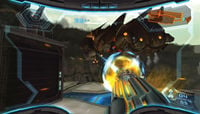
If she didn't start out with it, the Charge Beam was one of the first power-ups Samus would get in the Metroid games, starting with Super Metroid. A fully charged Beam's shot would become Samus's only way of damaging certain bosses should she run out of missiles. In Metroid Prime, Charge Beams can be used to clear debris blocking Samus's path or to suck in nearby Energy Balls and Ammo Energy, as well as being the starting point for Charge Combos. In the Metroid series, Samus cannot save a charge for later as she can in Smash Bros., though she can continue charging and just hold it for any length of time, as well as begin charging while in motion and in the air. In the Metroid games, the beam also charges noticeably faster.
Gallery
Samus in the process of charging her arm cannon in Super Smash Bros. Brawl.
Villager pockets a Charge Shot in Super Smash Bros. for Wii U.
Samus in the process of charging her arm cannon in Super Smash Bros. for Nintendo 3DS.
Samus shooting a fully charged blast in Super Smash Bros. for Wii U.
Samus in the process of charging her arm cannon in Super Smash Bros. for Wii U.
Palutena reflecting the attack in Ultimate.
Samus using Charge Shot as shown by the Move List in Ultimate
Dark Samus using Charge Shot as shown by the Move List in Ultimate
Trivia
- When Kirby uses this move, he uses his hands to charge and fire the shot. He will use two hands with Samus' copy ability, and only one with Dark Samus'.
- The charging sound for the Melee Charge Shot is shared with the Mii Gunner's Charge Blast.
- This move shares its name with Mega Man's forward smash.
